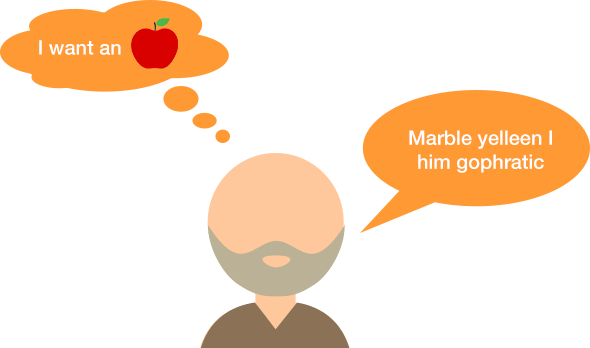The Word Won’t Escape Me Anymore
If you were ever interested in becoming acquainted with a speech impairment called aphasia and its effects on people, you probably read this amazing and very humane book “The Word Escapes Me: Voices of Aphasia”. This book brings reports of professionals and patients with aphasia (PWA) with emotional and realistic descriptions of what life is like when speech suddenly becomes a hassle. Although the book contains real stories involving all sorts of aphasia, this article will focus on Wernicke’s aphasia and how linguistics can help PWAs overcome it.
– Understanding the monster
Before we start talking linguistics and possible solutions that can bring speech back to its track we need to understand what Wernicke’s aphasia stands for.
Wernicke’s aphasia is a speech disorder derived from a stroke or another kind of brain accident that hinders oral competencies of people. The injury happens in the superior temporal lobe in the left hemisphere of the brain which means that comprehension of the language is directly affected, but differently from other types of aphasia, this one also disables the ability people have to understand and produce certain words intelligibly and so it is called the fluent aphasia (www.aphasia.org).
What this kind of impairment does to people’s speech can be noted in (1) and (2) and it is important to shift your attention to the person replying in this conversation (https://www.youtube.com/watch?v=szCeRbiEk6A) for it is the motive PWAs struggle getting their normal lives back, but in time, they realize that there is a new normal.
(1) Hi Nicole! What did you do this weekend?
(2) Hi Mary Kay! I went to the catabot and then I saw the gleeblabla…
– What does linguistics have to do with it?
At a first glance, this may seem more a medical issue than a linguistics topic for analysis, but if we take a closer look you will see that linguistics is just as related.
Considering Neurolinguistics, it is possible to find the relation since the superior front lobe of the left hemisphere is responsible for formulating our speech (Robson et al., 2014), i.e. when we are engaged in a conversation, the left part of our brain is the machine that puts words together, combines them in the syntax of our language and not least importantly, it also finds out the intention behind words and syntactic order. Then, all of a sudden PWAs find themselves in a situation where this part of their brains insists in not working as it did before.
This new situation shatters the person’s self esteem and this can be one of the factors that supports the idea that their intentions remain untouched even though their utterances are not in compliance. If we consider the previous dialogue, in (2) the patient clearly produced noises instead of words, but if they had access to maybe a written paraphrased text they could have a chance to communicate better. Given this situation, one can support that there is not a single utterance that is intention-free, i.e. every speech is then a locutionary sentence full of intentions and enforcements other than just say something (Austin, 1975).
A third connection between Wernicke’s aphasia and linguistics is regarding PWAs’ recovery. You may have heard of the term neuroplasticity before, but is that really clear to you? So, let’s figure it out. Even though we do have certain parts of our brain that is responsible for decoding certain types of information – the left superior temporal lobe is responsible for languages – many parts of our brain work at the same time when we speak or are exposed to speech. If our brains were an unchangeable organ, then there would be a limit for the amount of info we could insert in it, but that is definitely not the case for we learn, decode, relate new things all the time and yet our brains are still there, inside our skull. This happens due to the connection our neurons make with one another linking information which is called synapse. Considering that this can perfectly happen as long as there are neurons, PWAs have a chance to re-acquire their speech with a frequent amount of guided exposure which will then trigger the neural compensation, i.e. they will start using parts of their brain (mainly the right hemisphere) when engaged in a conversation.
– The words won’t escape anymore
We have seen in this article that Wernicke’s aphasia is a result of a brain injury mainly caused by a stroke that impairs speech regarding utterances, we have also talked about the connection between this impairment and linguistics theories when we linked aphasia with how languages are decoded, how preserved intentions can be a the key to speech re-acquisition and now we will see how Tomasello’s Usage-based Learning studies are aligned with a proposal to make PWAs’ speech become closer to what it used to be.
According to Wartenburger et al. (2003), meaning of words is a result of a declarative memory, i.e. someone will tell the meaning of a word and it will not hinge on assumptions or conjecturing. Indeed, this kind of exposure can benefit PWAs as it happens in classes where a teacher will design lessons which will provide patients with a great amount of exposure triggering parts of the brain that were not affected by the injury. This combination complies with studies on Usage-based Learning since this exposure will be the fuel for the neural combustion because the intervention of the teachers through their lessons might be the stimulus that these patients need to compensate the hemisphere that got impaired by the injury. Therefore, without this social input speech re-development would limp and opposite is also true. Without higher functions speech cannot be whole. If that was so, PWAs would not need any type of compensation to speak properly again, but they do need and they do compensate which leads us to one conclusion: we don’t have a specific organ dedicated to organize our speech, we learn to speak as we learn everything else – with exposure, repetition and reasoning (Tomasello, 2003).
Thus, the exposure to the language they want to re-develop will work as the model for the new brain connections so that the intention (previously stated as preserved) regain their proper outcome – the speech. The role linguists have in this new era of a patient is very important such as the understanding of how acquisition takes place and also the implications that this process has on the brain of the person. In addition to that, and maybe more important than anything else, respect the individual, have empathy, acknowledge their emotions and rescue their story. This will make our jobs easier.


